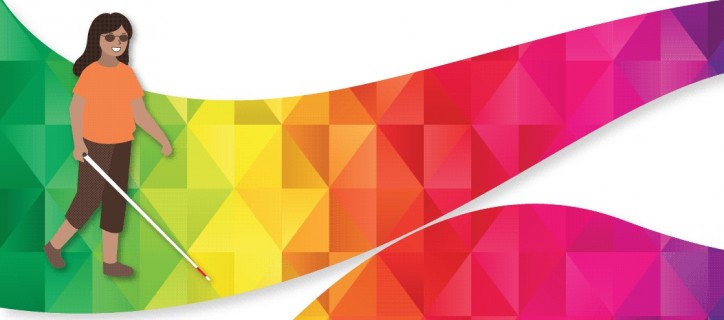“I firmly believe that understanding yourself also means understanding your context in the world around you. And I’m looking to continuously do that through travel.”
— Gillian Giles, study abroad alum
In different cultural contexts, you might find that local people or even fellow travelers perceive you differently from the way you’re perceived at home, which in turn might affect how you perceive yourself. Certain aspects of your identity may be outwardly “visible” or stand out more than others. You might find that, while overseas, some of the aspects of your identity that are the most meaningful to you, perhaps race, cultural heritage or disability, might seem to be overshadowed by other aspects of your identity that you don’t often think about back home, such as nationality, perceived wealth, and privilege.
As a project of the U.S. Department of State’s Bureau of Educational and Cultural Affairs (ECA), we at the National Clearinghouse on Disability and Exchange are committed to upholding the ECA Diversity Statement (see below) by consistently linking disability inclusion with diversity. We celebrate disability as an aspect of diversity which too often gets overlooked in diversity initiatives, but at the same time we recognize that people with disabilities have additional aspects of identity that are important to them and deserve space.
In this issue of A World Awaits You, we joyfully explore these questions: In what ways do our identities influence our international exchange experiences, ranging from the destinations we select to our interactions with people we meet abroad? And, in turn, how might international exchange present opportunities for us to understand identity in ways that aren’t as accessible at home?
To bring these important questions to life, we asked international exchange alumni with disabilities to reflect on their own experiences related to the dynamics and interplay of disability, nationality, race, socioeconomic status, gender, sexual orientation, cultural heritage, religion and more, all while traveling abroad. What they shared was, at times, refreshing, uplifting, frustrating, illuminating, challenging – sometimes all at once!
In carrying out Fulbright research on how Indian disabled women combat ableism, Istou Diallo found herself nourishing her own disability identity. At the same time, having been made hyper aware of her identities as a Black American in India, Istou formed new friendships that interrupted isolation with community and belonging.
A fascination with the culture of politics and identity of Latin America is what drew Emely Recinos to study in Buenos Aires. But to the local people she encountered there, Emely’s native Spanish fluency and physical appearance as a Salvadoran American prompted challenging questions about her nationality and culture.
Gillian Giles learned to take Amsterdam’s progressive image with a grain of salt. But without losing sight of the dynamics of racism, sexism, and colonization, they cherished the liberating experiences of meeting other queer people of color, celebrating with Amsterdam’s Surinamese community, and practicing self-care.
An insatiable traveler who is proud of his autistic identity and lifelong advocacy, David Sharif has sought out international opportunities to honor the legacies and traditions of his Jewish heritage, whether in Israel, Ecuador, or Europe – even when such experiences can be solemn and emotional.
Born in London and raised in Texas, Geraldine Dang felt she had few connections to her Asian heritage. An offer to study abroad in Japan and later intern abroad in Singapore presented an opportunity to explore this side of herself – all while broadening her global Deaf community.
Confronted with ableism, sexism and racism on a Barcelona tour bus, Johileny Merán mustered the strength to advocate for herself. The experience shone a spotlight on how her identities as a disabled Afrolatina woman are not only inextricably linked, but they also shape the way she experiences the world.
We’re grateful to these exchange alumni for trusting us with their inherently personal stories and did not take this task of publishing them lightly. As you read about their experiences and the accompanying diversity resources, we invite you to reflect on your own identity and the potential of international exchange to deepen your own appreciation and understanding of yourself!
The National Clearinghouse on Disability and Exchange is a project of the U.S. Department of State’s Bureau of Educational and Cultural Affairs, designed to increase the participation of people with disabilities in international exchange between the United States and other countries, and is supported in its implementation by Mobility International USA (MIUSA).
ECA Diversity Statement
The Bureau of Educational and Cultural Affairs of the United States Department of State strives to ensure that its efforts reflect the diversity of U.S. society and societies abroad. The Bureau seeks and encourages the involvement of people from traditionally underrepresented audiences in all its grants, programs and other activities and in its workforce and workplace. Opportunities are open to people regardless of their race, color, national origin, sex, age, religion, geographic location, socio-economic status, disability, sexual orientation or gender identity. The Bureau is committed to fairness, equity and inclusion.
This Introduction is part of the AWAY Journal Intersections Abroad: Travelers with disabilities explore identity and diversity through international exchange, continue reading the publication.
-
This is the Start
-
Next Article: Moving with Intention

